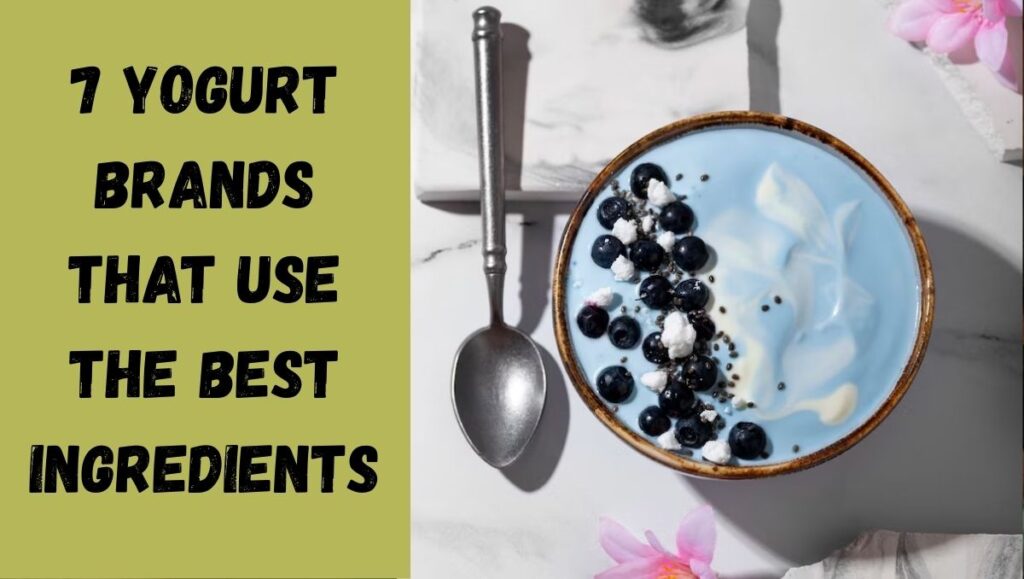Greek yogurt’s creamy texture, high protein count, and good probiotics have helped it to become somewhat well-known recently. Often recognized as a superfood, it is lauded by nutritionists, fitness buffs, and regular consumers all around. Straining normal yogurt helps to produce Greek yogurt by removing much of the liquid whey, lactose, and sugar, therefore producing a thicker, protein-rich result.
Still, not all Greek yogurts are made equal even if they have numerous advantages. Many store-bought products—especially those flavored or pre-packed with add-ins—are shockingly heavy in artificial ingredients, harmful fats, and added sugars. Regular consumption of these components can reduce the nutritional benefits and potentially harm health.
Although Greek yogurt can be a wonderful addition to a balanced diet, dietitians advise consumers to be careful about the brand and flavor preferences they choose. Many well-known Greek yogurt products tilt more toward decadent desserts than healthy snacks, and the “healthy” claim on packaging can occasionally be deceptive.
Six Greek yogurts found by nutritionists as the unhealthiest due to their high calorie counts, too much added sugars, saturated fats, and synthetic components are examined in this article. Knowing the details will help you to keep the health advantages Greek yogurt may provide and make wise judgments possible.
Cabot Triple Cream Vanilla Bean Greek Yogurt: Indulgence Over Nutrition
Triple Cream of Cabot Vanilla Bean is Greek yogurt markets itself as a thick, creamy texture, luxurious, indulgent choice. Made with extra cream, which greatly raises the fat level, it has a buttery texture that many people enjoy.
But the high fat content mostly comes from saturated fats, so nutritionists advise moderation in consumption of these foods. There about 13 grams of fat in a single serving, of which 8 grams are saturated fats. This level is regarded as somewhat high, particularly in relation to conventional Greek yogurues usually containing 0-5 grams of saturated fat per serving.
Increased LDL cholesterol, the “bad” cholesterol linked to heart disease, has been connected to too high consumption of saturated fats. Regular use of this yogurt could unintentionally increase cardiovascular hazards, particularly in those with pre-existing diseases.
Furthermore, Cabot’s Triple Cream Vanilla Bean Greek Yogurt has 21 grams of sugar per serving—far more than the 25 grams advised daily added sugar limit set by the American Heart Association for women and 36 grams for men. Because most of this sugar comes from artificial sweeteners instead than natural lactose, it fuels possible insulin resistance and blood sugar rises.
Although this product is clearly wonderful, dietitians advise against eating it too often—more of a treat than a daily snack. If one wants to have a heart-healthy diet, it is suggested to stick to plain Greek yogurt or low-fat variants with little added sugars.
Chobani Flip Cookie Dough: A Sugary Snack in Disguise
With mix-ins like cookie dough, chocolate, and nuts, Chobani’s Flip line is meant to draw customers seeking a more interesting yogurt experience. Among these, the Cookie Dough taste is especially appealing for dessert-like taste.
Still, this convenience comes with nutritional expenses. About 160 calories and 19 grams of sugar make up one 4.5-ounce jar, almost exactly what a candy bar has. Added sugars in the form of sweetened chocolate chips, cookie dough bits, and flavored yogurt base mostly count for this amount.
Regular use of this kind of product might cause erratic blood sugar changes. Increased risk of obesity, metabolic syndrome, and type 2 diabetes has been linked to high sugar intake.
Although this yogurt has a modest fat level—about 4.5 grams per serving—the main issue still is its sugar burden. The protein count is 9 grams, which is good but somewhat eclipsed by the heavy sugar count.
Dietitians advise against flavored Greek yogurts with additional sweeteners and instead advise adding natural toppings including fresh fruit, nuts, or seeds to basic Greek yogurt. This method produces taste and texture without needless artificial components or sweeteners.
Oikos Key Lime Traditional Greek Yogurt: Tasty but Sugar-Heavy
Those looking for something new from the traditional vanilla or strawberry will find Oikos’ Key Lime Greek Yogurt to be a tart and reviving taste sensation. The nutritional profile does, however, expose a secret drawback: sugar level.
With 15 grammes of sugar—of which 10 grams are added—each cup has roughly 140 calories. Beyond what naturally exists in milk, added sugars are those advised to be avoided by specialists because of their link to chronic disorders including diabetes and heart disease.
Apart from the sugar, the yogurt also has roughly 4 grams of fat and 11 grams of protein, so balancing macronutrients. The additional sugars cover the yogurt’s natural acidity, even with the appealing citrus taste.
Regular eating of high-sugar yogurts can compromise health goals by raising calorie intake without offering long-lasting fullness or nutritional value. Blood sugar rises and energy collapses brought on by the glycemic load could drive appetites for additional sugary foods.
Dietitians advise buying plain Greek yogurt and adding a splash of fresh lime or lemon juice for a comparable tangy taste without the additional sugar as a healthier substitute.
4. Ellenos Coffee Greek Yogurt: Dessert-Level Sugar and Calories
With its strong coffee taste, Ellenos Coffee Greek Yogurt is a distinctive offering that has drawn fans. Like many specialized flavored yogurts, though, it has a nutritional cost.
With a 7-ounce container, you get a startling 30 grams of sugar, 11 grams of fat, and a substantial 310 calories—the equivalent of some well-known coffeehouse beverages as Frappuccinos. Along with adding too many calories, this degree of sugar begs questions about long-term metabolic health and blood glucose regulation.
Further raising its risk profile is the high saturated fat content—about 7 grams. Although goods flavored with coffee can give a caffeine boost, the high sugar load may produce energy swings and cravings.
Though delicious, dietitians advise against regular consumption of this yogurt; it is better saved for occasional treats. Those seeking consistent energy and a balanced diet should think about simple, either sweetened or plain choices.
Fage Total 2% Honey: Portion Control is Key
Because Fage Total 2% Honey Greek Yogurt comes with a separate section of honey to add as preferred, it is sometimes considered as a semi-healthy compromise. When used completely, though, the supplied honey packet adds a lot of sweetness.
One 150 gram container of this yogurt plus the whole honey packet has about 180 calories and 28 grams of carbohydrates, largely from sugar. The American Heart Association advises women to consume no more than 25 grams of added sugar daily, thus ingesting the entire honey package puts one at or above that limit in one meal.
With just modest saturated fat, the yogurt itself has 2.5 grams of fat and 12 grams of protein. These figures make the base yogurt somewhat balanced, but the honey component can turn it into a sugar-filled snack very fast.
In this case, dietitians stress moderation. Still enjoying some sweetness, using only half of the honey packet or substituting fresh fruit will help regulate extra sugars. Though it’s a better choice than totally pre-flavored variants, this yogurt still needs careful eating.
The Greek Gods Honey Greek Yogurt: Creamy but Saturated with Sugar and Fat
The ultra-creamy texture of Greek Gods Honey Greek Yogurt is well-known for coming from adding cream to the recipe. The extra cream raises the saturated fat level to roughly 5 grams per cup even while it improves taste and mouthfeel.
This yogurt has 15 grams of additional sugars—from honey to brown cane sugar—along with the cream. This product is more of an indulgent treat than a beneficial yogurt choice given the total saturated fat and sugar load.
Dietitians caution against eating too much saturated fats since they can raise cholesterol and a high sugar intake can aggravate inflammation and increase risk of chronic diseases. Many of the probiotic and protein benefits Greek yogurt usually provides can be negated by these elements.
Plain Greek yogurt with a little drizzle of natural honey or fresh fruit is a great option for people seeking creamy texture free of extra fat and sugar.
Quick Glance at the Unhealthiest Greek Yogurts
| Yogurt Brand & Flavor | Calories | Total Fat (g) | Saturated Fat (g) | Sugar (g) | Protein (g) |
|---|---|---|---|---|---|
| Cabot Triple Cream Vanilla Bean | 260 | 13 | 8 | 21 | 11 |
| Chobani Flip Cookie Dough | 160 | 4.5 | 3 | 19 | 9 |
| Oikos Key Lime Traditional | 140 | 4 | 2.5 | 15 | 11 |
| Ellenos Coffee | 310 | 11 | 7 | 30 | 20 |
| Fage Total 2% Honey | 180 | 2.5 | 1.5 | 28 | 12 |
| The Greek Gods Honey | 210 | 9 | 5 | 15 | 7 |
How to Choose a Healthy Greek Yogurt
When choosing Greek yogurt, one must examine the nutrition facts label and go past brand and flavor buzz. Dietitians advise these important pointers:
- Check Added Sugars: Look for products with 5 grams or less of added sugar per serving. Ideally, choose plain or lightly sweetened varieties.
- Monitor Saturated Fat: Prefer yogurts with low saturated fat, especially if you have heart disease risk factors.
- Protein Content: Greek yogurt should have at least 10 grams of protein per serving to qualify as a good protein source.
- Ingredients List: Avoid products with artificial sweeteners, colorings, or preservatives. The shorter and simpler the ingredient list, the better.
- Live Cultures: Confirm the yogurt contains live and active cultures to gain probiotic benefits.
Enjoy Greek Yogurt Wisely for Optimal Health
Supporting digestion, muscle function, and general well-being, Greek yogurt is a great source of protein, calcium, and probiotics. Not all Greek yogurts, meanwhile, are equally good. Many well-liked types are loaded with artificial substances that compromise their health advantages, saturated fats, and added sweets.
You can keep a healthy diet without compromising taste by eliminating the least healthy choices include Cabot Triple Cream Vanilla Bean, Chobani Flip Cookie Dough, Ellenos Coffee, and others mentioned above. Choosing plain Greek yogurt and improving it with natural fruits, nuts, and little honey amounts provides a better and more balanced approach to savor this dairy treat.
Eat flavored yogurt in moderation and always closely review labels. Greek yogurt can stay a great and health-conscious addition to your regular diet with thoughtful decisions.
FAQs
Q1: Why should I avoid Greek yogurts with high added sugar?
Added sugar can contribute to weight gain, blood sugar spikes, increased risk of type 2 diabetes, and heart disease. Reducing added sugars is essential for long-term health.
Q2: Is low-fat Greek yogurt always a better choice?
Not necessarily. Some low-fat yogurts compensate for reduced fat by adding sugars or artificial ingredients. Always check the nutrition label for sugar and ingredient quality.
Q3: Can I make my own flavored Greek yogurt at home?
Yes! Mixing plain Greek yogurt with fresh fruits, a drizzle of honey, vanilla extract, or cinnamon is a healthy way to enjoy flavors without excess sugar or additives.
Q4: Are all Greek yogurts probiotic-rich?
No. Only those labeled with live and active cultures contain probiotics. Look for this label if you want to gain digestive benefits.
Q5: How much Greek yogurt should I eat daily?
About 1 to 1.5 cups per day is generally recommended, but portion sizes should fit your overall dietary needs and health goals.


